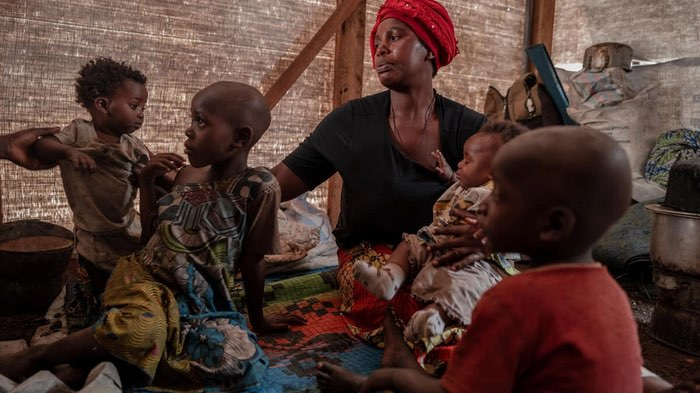
Mwamini, 39, and four of her children at their shelter in the Bushagara displacement site near Goma, DRC-© UNHCR/Guerchom Ndebo
By Cedric Kalonji and Donna Omulo
By 9 a.m., Odette, 44, has already been toiling for hours, tidying her family’s makeshift shelter and pausing to check a pot of beans simmering over an open fire made with wood she collected at first light. “This is today’s meal,” she said with a smile. “We usually add cornmeal, but today it’s just beans.”
Originally from Saké, some 20 kilometres west, Odette, her husband and their nine children recently arrived at the Lushagala Extension displacement site outside Goma, the capital of North Kivu Province in eastern Democratic Republic of the Congo (DRC). This sprawling settlement hosts more than 36,500 families, the vast majority of whom were forced from their homes in Masisi territory by an upsurge in violence in recent months.
“We were woken in the middle of the night by explosions. Gunfire from a nearby hilltop threw us into a panic. We fled immediately,” Odette recalled. “The next morning, we saw many dead bodies. That’s when we knew we couldn’t go back. We walked for two days to reach Lushagala, grieving for the loss of our relatives but relieved to find some safety.”
The DRC’s protracted, complex and vicious conflict has displaced over 6.4 million people within the country, which is also host to more than 525,000 refugees from nearby Central African Republic, South Sudan, Rwanda and Burundi.
This mass, ongoing displacement has placed further strain on already limited resources. Odette’s story mirrors that of countless others forced to flee the renewed violence. In the first half of 2024 alone, nearly a million people were displaced – many more than once. While some find welcome with local families around Goma, most crowd into spontaneous or formal sites, where they face persistent security risks and limited availability of aid.
Access to basics like food, shelter and health care remains insufficient. Soaring food prices and repeated epidemics compound the struggles for both displaced people and the communities helping them.
Alarmingly, women and girls are exposed to heightened risk of gender-based violence, with many subjected to sexual violence as they fled conflict and many driven into survival sex work to feed themselves and their families. In North Kivu alone, reported cases of gender-based violence rose from 20,771 in early 2023 to 27,328 in the same period of 2024, with rape comprising 63 per cent of incidents. Underreporting means the true levels are likely to be much higher.
Struggling to survive
Odette works tirelessly to support her family however she can. Thanks to a small-business promotion scheme and grant provided by UNHCR, the UN Refugee Agency, she owns a modest shop and drinks stand near her shelter. “Before, life was good because we could feed ourselves from the food we grew on our land, but now we have to make do with limited resources,” she said. “These small businesses help me provide essentials for my family. It’s not much, but it’s something.”
Mwamini, 38, trekked for 93 kilometres to reach safety with her five children, including an infant, after fleeing violence in their village. During their escape, she was separated from her husband and has not seen him since. Mwamini and her children now live in Bushagara, another displacement site close to Goma. “We walked for two weeks, sleeping on the roadside,” she said. “We begged for food and water along the way.”
Relieved to have reached the site, Mwamini remains anxious about the future. She worries about her children, now unable to attend school, but her most immediate concern is food. “Life here isn’t ideal. Yes, it’s safer – we don’t hear gunfire, and we aren’t living in constant fear. But what we need most now is shelter and food. I’m breastfeeding but haven’t had breakfast this morning.”
Dreams of home
Amid the deteriorating humanitarian situation, UNHCR, the UN Refugee Agency, and other organizations are working to meet the essential needs of displaced people. But UNHCR’s ability to adequately respond to the crisis is being hampered by an acute shortage of funds, with only 40 per cent of the $250 million required to help displaced people in the DRC in 2024 received by the end of October.
“What we want is for the authorities to end the fighting so we can go home,” said Mwamini, echoing the hopes of many displaced people in eastern DRC.
Odette also dreams of a lasting peace that would allow her family to return home and rebuild their former lives. “Before we fled, we were planning to expand our home to give our children a better life,” she said.
During her long hours of tireless work to support her family, she often imagines a conversation with those fueling the crisis. “If I had the chance, I’d ask them if they understand the suffering they’re causing,” she said. “I’d ask them to come to their senses and stop.” (End)
